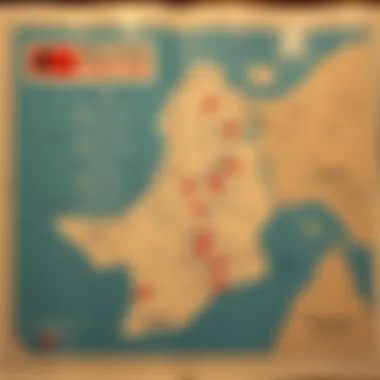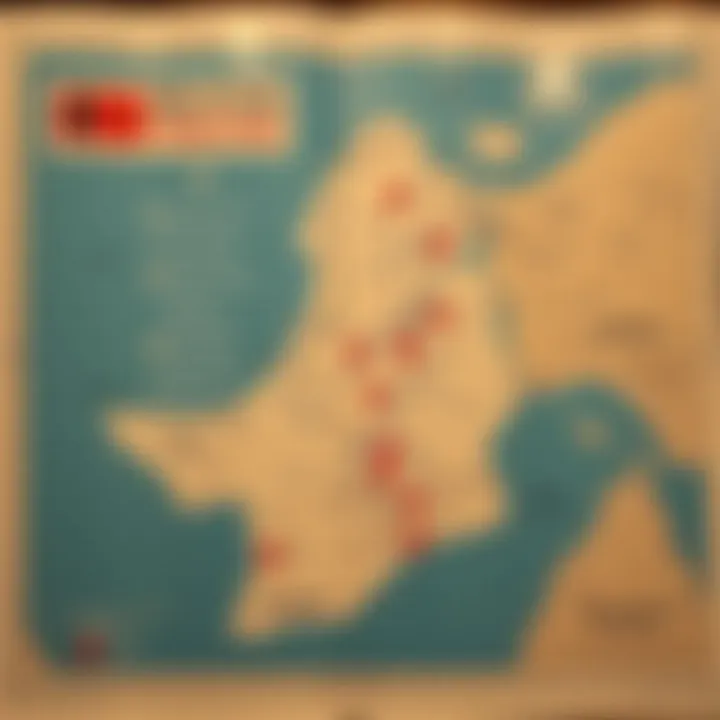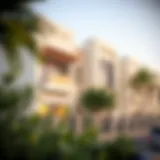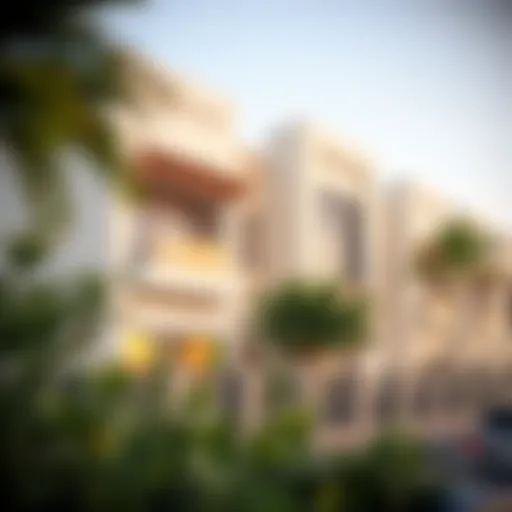Understanding Dubai's Postal Code System and Its Impacts


Intro
Dubai's postal code system may not be the first thing that springs to mind when people think about this bustling metropolis, but it plays a pivotal role in the city's logistics, urban planning, and real estate markets. Postal codes are not mere numbers; they are essential tools that facilitate everything from mail delivery to property assessments. For potential investors and property buyers, understanding this system can be as crucial as knowing the latest trends in the housing market.
The unique geographical and cultural landscape of Dubai necessitates a tailored postal code system that reflects its diverse neighborhoods and massive urban developments. In this article, we will dive into the intricacies of the postal code system in Dubai, elucidating how these codes connect to various facets of life in this renowned city.
As we sift through the layers, we will uncover the significance of postal codes in urban planning and their specific roles in influencing logistics and property management. By the end, we aim to equip real estate agents, investors, buyers, and developers with the knowledge to navigate Dubai's distinctive postal landscape.
The interconnectedness of postal codes with various sectors in Dubai can’t be overstated. Postal codes serve as navigational beacons in real estate, impacting property values and even determining investment viability. Let's now explore the current market trends that shape the realities of property transactions in Dubai.
Understanding Postal Codes
The postal code system serves as a backbone for addressing and navigating urban landscapes. Understanding this system is crucial, especially in a city like Dubai where rapid development and diverse residential and commercial areas create a demand for precise location identification. Postal codes enable efficient mail delivery, optimize logistics for businesses, and assist in urban planning. For real estate investors and buyers, comprehending how postal codes function can be the difference between uncovering hidden gems and missing out on prime opportunities.
Definition and Purpose
At its core, a postal code is a series of letters, numbers, or both, assigned to specific geographical areas. The primary purpose is to facilitate mail delivery but it extends further into various sectors. In Dubai, where a melange of cultures coexists, postal codes significantly reduce confusion in locating addresses. For example, a well-defined postal code helps in quickly identifying a place like Jumeirah Village Circle, which comprises multiple communities, ensuring that deliveries do not go awry.
Additionally, postal codes play a role in geolocation technologies, making them pivotal for mapping services or navigation apps. They provide users with information on a place's demographic and socioeconomic status, which is invaluable for businesses aiming to cater to specific markets.
Global Postal Code Systems
Globally, postal code systems vary widely. In countries like the United States, the ZIP code format, which typically consists of five digits, helps in denoting regions with unmatched specificity. Meanwhile, the UK's postcode system breaks down areas into smaller components, often covering a single street or even a single building. This detailed granularity allows the UK to manage its mail delivery with remarkable efficiency.
In comparison, Dubai's codes may appear less complex, yet they hold their own unique structure. The Emirates Post Group oversees postal codes in the UAE, implementing a system designed to address the rapid expansion of Dubai’s urban areas. This adaptability is vital in a city known for its ongoing development projects. As Dubai continues to grow, these codes become strategic tools for keeping up with dynamic changes.
"Understanding the intricacies of postal codes in Dubai can not only streamline business operations but can also deeply enrich the experience of living in or visiting this vibrant city."
In summary, postal codes are not merely a string of letters or numbers but a pivotal element in efficient communication, logistics, and planning. Gaining clarity on how these codes operate within the framework of Dubai’s urban infrastructure is essential for stakeholders in various sectors.
Dubai's Unique Addressing System
When one thinks of Dubai, images of modern skyscrapers, bustling markets, and luxe lifestyles often come to mind. However, behind this vibrant facade lies a complex yet crucial element—its postal addressing system. Unlike traditional postal codes seen in many countries, Dubai's system strikingly reflects its unique urban layout and the intricacies of its rapidly expanding population. Understanding this system is esssential for anyone involved in real estate or logistics here, as postal codes carry significant implications for property valuation and service delivery.
Geographical Context
Dubai is more than just another metropolitan area; it is a bustling hub that connects the East with the West. Geographically, it sprawls over approximately 4,114 square kilometers, divided into various neighborhoods and developments. Each area within Dubai possesses distinct characteristics, demanding a precise method of identification. The postal code system is designed to streamline this process, allowing individuals and businesses to easily navigate through myriad localities.
One such example is the International City, a vast residential and commercial area. The geographical diversity in neighborhoods from Dubai Marina to the Arabian Ranches necessitates an efficient distribution mechanism. The postal code assigned to any location encompasses not only its address but also influences logistics and real estate dynamics.
"A well-organized postal system facilitates not just mail delivery, but also enhances urban functionality and economic growth."
Development of Postal Codes in Dubai
The evolution of Dubai's postal code system has been a response to its phenomenal growth. Initially, Dubai did not have a formal postal code system in place. Instead, many relied on local landmarks and business names for direction. As the population surged and the city transformed into a global business hub, the need for a robust postal system became more urgent.
Around the turn of the century, the Dubai authorities began to introduce postal codes to ease the management of mail and improve service delivery. However, these codes are not necessarily intuitive. For example, a postal code in Dubai might not indicate geographic proximity as one might expect. Instead, it often correlates with the administrative boundaries set by postal authorities, reflecting areas of development rather than mere geographic coordinates.
As a result, real estate developers and investors need to remain cognizant of these nuances. For example, a property situated on a bustling street may have a different postal code than one located just a few meters away, changing its market perception entirely.
In essence, Dubai's unique addressing system is not just a matter of convenience but a vital component influencing various sectors, from real estate valuation to logistical operations. Understanding it is paramount for anyone wishing to engage effectively with this dynamic city.
International City Overview
The International City area of Dubai is a significant landmark featuring diverse residential and commercial zones. This development holds a strategic position, unfurling a blend of multicultural environments appealing not only to residents but also to investors and business owners. Understanding the layout and utilities of International City contributes to comprehending how postal codes interlink with urban planning and logistics.


Residential Developments in International City
In International City, residential offerings are kaleidoscopic. The developments range from cozy apartments to larger villas, catering to a variety of living preferences. This diversity makes International City an attractive destination for families, singles, and expatriates looking for affordable housing within a vibrant community.
Properties in the area are often favored for their competitive pricing, especially when compared to other hubs in Dubai. One notable feature is the design concept of themed clusters. Each cluster reflects a different culture, contributing to a unique ambiance. For instance, the China Cluster and the Europe Cluster are distinguished by their architectural styles and landscaping. This form of diversification not only enhances livability but also creates investment opportunities as buyers seek properties within culturally rich environments.
Moreover, the strategic location offers easy access to major thoroughfares. Residents enjoy proximity to the Dubai International Airport, making it equally appealing for those seeking rental properties.
Commercial Hubs and Amenities
The commercial aspect of International City is just as vibrant as its residential side. The area is home to several retail outlets, restaurants, and business centers that cater to both local and international clientele. This bustling commercial framework plays a crucial role in supporting local jobs, which in turn fosters community growth and stability.
Several key elements contribute to the commercial viability of International City:
- Retail Markets: The Dragon Mart, one of the largest trading hubs for Chinese products outside mainland China, is a notable presence. It offers a wide range of products, from electronics to home furnishings, becoming a shopping destination that attracts visitors from all over the city.
- Business Parks: International City also hosts diverse offices and business license solutions, making it a sought-after location for entrepreneurs and startups keen on tapping into Dubai's booming economy.
- Amenities: Residents have access to recreational areas, parks, and schools, enhancing the community feel and ensuring that all daily necessities are within reach.
This combination of residential and commercial facilities fosters a thriving community, underlining the importance of proper postal code management. By assigning precise postal codes, Dubai ensures streamlined logistics and effective service delivery, providing a backbone to facilitate day-to-day operations for both citizens and businesses.
"A well-defined postal code is more than just a number; it’s a vital component in urban organization and communication—especially in a complex, rapidly developing metropolis like Dubai."
As we dive deeper into the intricacies of postal codes in this ongoing exploration of Dubai's postal system, the overview of International City lays the groundwork for understanding how such systems enhance livability, influence property valuations, and optimize logistics.
Postal Code Assignments in International City
In the vast landscape of urban planning, understanding postal code assignments in Dubai's International City is essential. Here, postal codes serve not merely as numbers but as vital tools that drive real estate dynamics, logistics, and community alignment. Assignments of these codes are crucial because they enhance navigation, facilitate efficient mail delivery, and play a significant role in property valuation. Ultimately, this understanding aids real estate agents, developers, and investors in making informed decisions.
Structure of Postal Codes
Dubai has a pragmatic approach to postal code structuring, particularly evident in areas like International City. The basic structure typically involves a five-digit code, which usually encapsulates specific zones or areas within the city. This coded system allows for precise delivery of mail and services, streamlining logistics and supporting the city's rapid growth.
For instance, the first digit typically indicates the region, while succeeding digits further refine the location within that area. Understanding this structure can be advantageous for potential buyers and real estate professionals. It allows a clearer grasp of distance, neighborhood dynamics, and logistical nuances related to property management.
Thus, knowing how a postal code is structured offers a significant advantage by simplifying location identification and enhancing property search efficiency.
Key Postal Codes for International City
Several key postal codes are associated with differing developments within Dubai's International City. Here’s a brief overview:
- International City Phase 1: The postal code here helps to pinpoint residential clusters, which feature various styles of housing from apartments to townhouses.
- Dragon Mart: This area has a unique postal code that categorizes it as one of the significant commercial hubs in the vicinity, making it vital for distribution and retail logistics.
- Residential Blocks: Various blocks within International City are assigned individual postal codes, greatly aiding residents and service providers alike in logistics and mail deliveries.
Understanding these specific postal codes not only enhances day-to-day navigation but also plays a critical role in property appraisal and investment strategies.
Having the right postal code information can expedite processes for prospective buyers and investors alike, making them better equipped to navigate the area's real estate market effectively.
The implications of these postal assignments stretch beyond mere organization; they are instrumental in bolstering the urban framework of Dubai, further accentuating the importance of a well-thought-out postal infrastructure.
Importance of Postal Codes in Real Estate
In today's real estate landscape, understanding postal codes goes beyond just mailing addresses; it's a vital aspect intertwining with property values, investment strategies, and logistics. In a diverse and rapidly evolving city like Dubai, where urban developments such as International City are prominent, postal codes play a significant role in shaping residential and commercial dynamics.
Impact on Property Valuation
The influence of postal codes on property valuation can’t be understated. When appraisers gauge the worth of a property, they don’t merely look at the physical attributes; location often reigns supreme.
Here’s how postal codes weave into the valuation process:
- Neighborhood Comparables: Appraisers often rely on comparables from similar postal code areas to establish fair market value. Properties in cosmopolitan, well-connected postal codes may fetch higher prices than those in remote regions.
- Access to Amenities: Many buyers prefer neighborhoods that offer conveniences like schools, hospitals, parks, and malls. Postal codes often determine proximity to these essentials, directly impacting desirability and ultimately, property values.
- Demand Fluctuations: Economic trends and demographic shifts can create sudden surges in demand in specific postal code areas, significantly raising prices. Investors, keen on capitalizing on these shifts, must remain informed about these changes in localized demands.


Overall, a well-assigned postal code can significantly enhance a property's marketability, drawing in savvy buyers who value the advantages of being situated in a prime area.
Facilitating Property Management
Postal codes are essential in streamlining property management. Property managers navigate complex logistics in bustling cities, dealing with maintenance, tenant relations, and service coordination.
Several ways postal codes assist property management include:
- Service Coordination: Knowing the postal code helps managers align services like maintenance and cleaning efficiently. This ensures timely responses to tenant requests and keeps the property in optimal condition.
- Targeted Marketing: For property owners looking to rent or sell, knowing the demographic nuances expressed through postal codes aids in crafting targeted marketing strategies. This can attract the right tenants or buyers who align with the property's offerings.
- Regulatory Compliance: Different areas might have unique regulations or requirements. Postal codes provide a quick reference for property managers to ensure compliance with local laws.
Ultimately, understanding the significance of postal codes and their implications on property management can effectively enhance operational efficiency and tenant satisfaction, serving as a backbone for successful real estate ventures.
Logistical Considerations
The postal code system in Dubai plays a pivotal role in the logistical framework of the city. With its rapid expansion and diverse population, efficient mailing and delivery services are necessary to ensure smooth operations across various sectors. The significance of this system cannot be overstated, as it forms the backbone of effective communication, transportation, and ultimately, economic growth.
Mailing and Delivery Services
In a bustling metropolis like Dubai, the accuracy of postal codes is crucial for fast and reliable mailing and delivery services. Postal codes help streamline the delivery process by allowing service providers to calculate routes and schedules with precision. For instance, the specificity of postal codes means that packages can be routed to the exact address without unnecessary delays. Tracking a parcel becomes easier too; customers can see exactly where their order is at any given point, making them feel more at ease with online shopping.
Additionally, businesses, both large and small, depend on efficient mail services. For example, e-commerce companies in Dubai can thrive thanks to a robust postal code system that enhances packaging, sorting, and transportation methods. Without a dependable postal system, they risk running into confusion over deliveries, which can tarnish reputations and ultimately impact sales.
"In any urban environment, regularity and reliability in mailing can turn a local business into a trusted brand."
This highlights the importance of having distinct postal codes. When customers can easily identify their location, they can expect timely deliveries, fostering loyalty toward businesses.
Business Operations and Supply Chains
For businesses operating in Dubai, postal codes do more than just help with deliveries; they also improve operational efficiency across various functions. Take supply chains, for example. Having a clear postal code system allows businesses to manage inventory levels effectively. They can easily identify suppliers and monitor product distributions across neighborhoods, optimizing storage and reducing costs.
Moreover, logistics firms benefit immensely from knowing the specific postal regions. They can allocate resources, like vehicles and staff, in accordance with the areas with the highest demand. The accuracy of postal codes translates to quicker response times, ensuring customers receive their goods when they need them.
On the flip side, inconsistencies in postal codes can wreak havoc on logistics operations. A wrong or outdated postal code could send products on a wild goose chase, leading to delays and increased operational costs. Businesses aiming for global reach must keep abreast of postal code changes in Dubai as these directly affect international shipping and handling.
In summary, a well-structured postal code system bolsters logistical operations in Dubai. Whether it’s allowing smooth and prompt delivery services or enhancing the management of supply chains, the benefits are manifold. For anyone involved in real estate, understanding these logistical considerations is paramount for navigating the dynamics of property investments and management in this vibrant city.
Challenges in the Postal System
The postal system in any city inevitably encounters a number of hurdles that can impact its overall efficiency and effectiveness. In Dubai, the unique blend of rapid urbanization and a multicultural environment intertwines to form a complex landscape for postal codes and their functionality. Understanding these challenges is crucial for stakeholders ranging from real estate investors to logistics providers. The considerations around postal codes go beyond mere digits; they offer insights into urban planning, service delivery efficiency, and even neighborhood dynamics. By addressing the issues present in the current postal setup, Dubai can enhance its infrastructure and services, making it more appealing for business and living.
Inconsistencies in Postal Codes
Inconsistencies present a fundamental barrier in the postal code system of Dubai. While the intention behind a postal code is to provide clarity and streamline mail delivery, numerous irregularities have emerged over time. For instance, some areas may share the same postal code, causing confusion among residents and delivery services alike. Potential investors or buyers looking into property might find themselves at a loss when different buildings or areas exhibit the same code, complicating their research and logistical planning. As several developments spring up seemingly overnight, these inconsistencies can cause miscommunication between delivery services and residents.
"Navigating the Dubai postal code system requires understanding the varying codes associated with regions, which can sometimes run amok and lead to crucial errors in service delivery."
Moreover, with a significant number of expatriates forming the demographic fabric of Dubai, comprehension of the postal code system is often limited. This leads to further complications when mail and parcels do not reach their intended location.
Technological Adaptations
In response to these inconsistencies and other operational challenges, there's an ongoing push for technological adaptations within the postal system. Singapore, for instance, has effectively utilized advanced Geographic Information Systems (GIS) to better map and assign postal codes. Implementing similar technologies in Dubai could improve the clarity and precision of postal codes significantly. With ongoing developments in mobile applications, users might soon be able to navigate the postal landscape more seamlessly, thanks to real-time data updates.
Furthermore, integrating blockchain technology into postal operations could bolster security and transparency in deliveries. Imagine an ecosystem where each package's journey is tracked and verified, reducing the likelihood of errors caused by duplicate postal codes or mislabeling.
Enhancing the technological framework of Dubai's postal system not only aims to solve existing problems but also future-proofs the community against challenges as it continues to grow. As residential and commercial hubs expand, a robust and adaptive postal infrastructure becomes imperative for efficient operations.
With advancements in technology, communities can look forward to a future where postal codes serve their intended purpose without the common pitfalls faced today.


Practical Insights for Investors
Investors looking into the Dubai real estate market need to understand that postal codes do more than just organize mail. They are key indicators of local dynamics, affecting factors like property value, accessibility, and even community engagement. By getting a grasp on how to leverage postal codes effectively, investors can carve a niche for themselves and tap into opportunities that others might overlook.
Researching Property Location via Postal Codes
When scouting for potential investment properties, postal codes serve as a first point of reference. They can help investors filter searches by area, steering them towards neighborhoods that align with their investment goals. Understanding postal code boundaries helps in identifying not just the physical location but also the socio-economic characteristics of an area.
For example, areas within the international city postal codes are known for diverse housing options and affordability. Investors can quickly gauge the price trends by comparing postal codes, which leads to an informed decision based on market demands. By focusing on properties within certain postal codes, you can also assess the rental yields and vacancy rates.
Furthermore, resources like Dubai Land Department's database can provide insights into transaction history tied to specific postal codes. The clearer the data, the better the decision-making. Researching these aspects will enable investors to strategically select properties that are likely to appreciate over time.
Assessing Neighborhood Dynamics
A postal code shouldn't just be a number; it signifies a broader landscape that impacts the lifestyle of its residents. Understanding the dynamics of a neighborhood ensures that investments are made in areas that not only attract buyers but also have potential for growth. Postal codes can give hints about community avenues, amenities, and social infrastructure.
Here are a few elements to consider:
- Amenities: Research what services are available, like grocery stores, schools, parks, or healthcare facilities. Areas with ample facilities usually attract families and long-term residents, hence sustaining value.
- Time to City Centers: Ease of commuting can influence desirability. Neighborhoods that provide quick access to job markets or popular venues tend to maintain higher property values.
- Community Engagement: Insights into how residents interact within postal code areas can reveal lifestyle trends. An active community often leads to stability and can positively affect property values over time.
Understanding neighborhood dynamics through postal codes can provide a lens into future trends and residential satisfaction.
The integration of postal codes in neighborhood assessments allows investors to critically analyze the market. It’s more than just numbers; it’s about tapping into the pulse of the community, which is invaluable for anyone looking to make a wise real estate investment in Dubai.
Future of Postal Codes in Dubai
The evolution of postal codes in Dubai is more than just numbers on an envelope; it reflects the rapid urbanization and development of this thriving metropolis. Understanding the future of postal codes is crucial for diverse stakeholders, from real estate agents to urban planners. As urban growth continues at a breakneck speed, the postal system must adapt, innovate, and find smarter ways to facilitate communication and logistics. This section digs into anticipated changes in Dubai's postal structure and broader urban trends that will shape how these codes serve the community.
Impending Changes and Innovations
Dubai’s drive towards modernization and innovation is evident across various sectors, and the postal system is no exception. With a focus on digital transformation, anticipated changes include:
- Adoption of Smart Technologies: Integration of smart city technologies could enhance the efficiency of mail delivery services. Imagine a system where postal codes are linked to real-time traffic data, allowing for faster and more reliable deliveries.
- Enhanced Geographic Information Systems (GIS): Future postal codes may incorporate advanced GIS, improving accuracy in location tracking. This can lead to better user experience in logistics and emergency services.
- Streamlined Address Verification: As digital commerce grows, so does the need for reliable address verification systems. Innovations may help clear up inconsistencies in existing postal code structures and ensure smoother transactions for businesses and consumers alike.
These changes will not only modernize Dubai’s postal system but will also have significant implications for real estate and logistics, particularly in densely populated areas like International City.
Projected Trends in Urban Development
As Dubai presses ahead with its ambitious urbanization plans, the future of postal codes will likely align closely with several key urban development trends:
- Increased Mixed-Use Developments: As the trend towards mixed-use development continues, the postal code system will need to adapt. New clusters of residential, commercial, and recreational spaces will necessitate more specific postal distinctions to ensure efficient services.
- Sustainability Initiatives: The push for sustainable urban planning may influence postal code assignments. Areas with eco-friendly infrastructure might have unique postal identifiers to promote green initiatives in logistics and deliveries.
- Population Growth and Urban Density: As new populations move into Dubai, there will be a growing demand for newly designed postal codes. This will involve not only creating new codes but also adapting existing systems to accommodate increased density.
"The postal code system is not just a logistical tool; it's a blueprint for future urban planning in a dynamic city."
Concluding Remarks
Understanding the postal code system in Dubai is fundamental for various stakeholders, particularly real estate agents, investors, buyers, and developers. This comprehensive article has journeyed through the nuances of how postal codes operate in the context of urban development, real estate dynamics, and logistical operations within the city.
Summary of Key Points
Throughout this discussion, we uncovered several critical insights:
- Structure of Postal Codes: Recognizing the layout of Dubai’s postal codes helps in pinpointing exact locations, which in turn facilitates better service delivery and streamlined property management.
- Impact on Real Estate: The influence of postal codes extends beyond mere logistics. They play a pivotal role in property valuation, market trends, and investment potential, shaping how buyers perceive areas.
- Logistical Role: Postal codes ease mailing systems and delivery services, essential in a bustling metropolis where quick turnaround times are often expected.
- Future Trends: As Dubai develops further, postal codes will likely evolve, driven by technological advancements and urban expansion. Staying abreast of these changes can provide competitive advantages for investors and developers.
This summary encapsulates the essential factors that define the postal code system, rendering it invaluable for anyone interested in Dubai's real estate landscape.
Final Thoughts on the Dubai Postal Code System
The postal code system in Dubai is more than a mere numerical designation; it serves as a foundational aspect of the city’s infrastructure. It facilitates not just effective communication and delivery, but also influences property values and neighborhood dynamics.
Investors who grasp the complexities of this system position themselves to make informed decisions, understanding well which areas are flourishing and why. Similarly, real estate agents equipped with this knowledge can better advise clients, providing insights that can sway significant investment choices.
In a nutshell, the postal code system is a barometer of Dubai's ongoing urban evolution. The interplay of codes with development plans and market trends implies that a keen eye on postal updates could unlock numerous business opportunities in this vibrant market. Hence, keeping a finger on the pulse of Dubai’s postal code shifts will undoubtedly benefit those looking to navigate its unique postal landscape.











